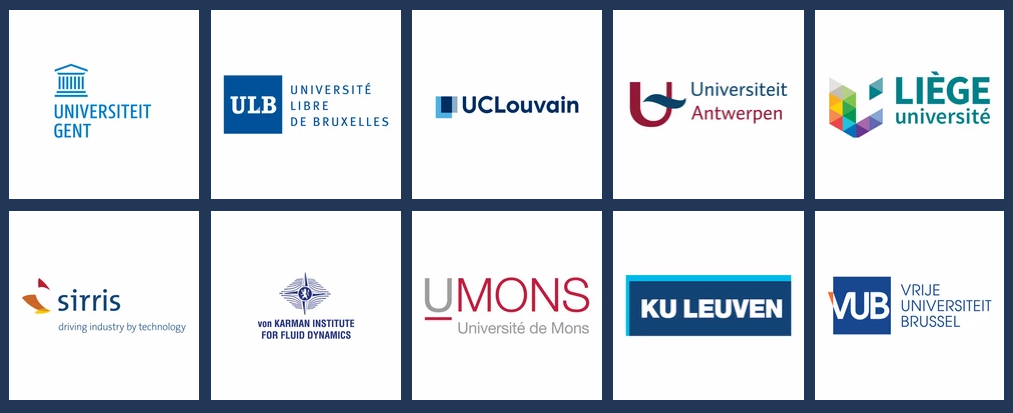Belgium is one of the frontrunners of offshore wind energy in Europe, with 2.2 GW already installed and new wind energy zones planned. To make sure we keep this position and to support our industry with the latest technology trends, scientific advances and innovative ideas, we need a strong academic home base. This is exactly what the PhairywinD project is offering.
Our Belgian offshore wind zones are already well established, with the last zone (Seamade) currently under development. A second big zone is foreseen in the new Marine Spatial Plan, covering the Fairybank, Noordhinder Zuid & Noordhinder Noord, and is expected to be developed from 2024 onwards, putting Belgium even more on the European offshore wind map. The PhairywinD project will run for 5 years and sits exactly in the middle of these two big waves of Belgian offshore wind development.
Objectives of the PhairywinD project
The main object of PhairywinD is to establish a close community of 9 PhD researchers from different Belgian knowledge institutes in order to tackle the current and future challenges of the Belgian offshore wind energy sector. These nine researchers all study their own dedicated subjects ranging from legal issues to design optimisation and wind-wave prediction for vessel operations to high-spectral imaging for nondestructive testing and improved meteorology, and much more.
What sets this multi-disciplinary and intersectoral training and research project apart is its connectivity: connecting nine Belgian knowledge institutions on the topic of offshore wind on the one hand, and linking key industrial players with Belgian research partners on the other hand. This way, once the new Belgian offshore wind zones are underway, Belgian academic support, knowledge and input will be guaranteed.
Innovative training network
All researchers will be deployed in one Belgian knowledge institution. They will perform their research there, under the supervision of their promoter. However, different to a regular doctoral research, the PhairywinD researchers will be embedded in a larger, cross sectoral structure. The PhairywinD innovative training network, where both technological and non-technological disciplines will be represented, guarantees a holistic approach towards the offshore wind energy challenges. Furthermore, this training network will organise dedicated workshops, agility training and WindWeeks to immerse the researchers in the offshore wind energy world.
By the end of the project, these young researchers will have a strong network, within and beyond their domain of expertise, and will be ambassadors for offshore wind energy research within and outside there universities. They will also be able to place their own work in a larger, international framework and the general context of the sector.
We’re off to a great start
- The project officially started in March this year and despite Covid-19 measures some of our PhDs have already started their research.
- In September this group will be immersed in the world of offshore wind energy during our first WindWeek. This week-long training will be hosted in Ostend Science Park.
- Furthermore, the official PhairywinD website has just been released today: www.phairywind.be It will be a gateway to follow the progress and growth of our young researchers and their network.
A word from our researchers
Let’s hear what 3 of our young researchers have to say about the PhairywinD project (pictures available):
- François Trigaux (24) - UCLouvain: “As an engineer, I want to help with one of the biggest challenges of this century: the transition towards a sustainable energy system. Wind energy is a formidable way to achieve this goal. What I especially like in this sector is its fundamental multi-disciplinarity: different branches of engineering, as well as economics and law collaborate into thriving projects. PhairywinD truly embodies this collaboration idea by bringing researchers from very different backgrounds together.”
- Thomas De Kerf (33) – UAntwerpen: “My ultimate goal is to be able to predict when and where corrosion will arise using only a camera on offshore wind turbines. I won’t be using normal RGB cameras but newly developed hyperspectral cameras that are rapidly decreasing in price, thanks to new developments. Offshore wind has tremendous potential and if this research could increase the lifetime of a turbine just a little bit, that would be great!”
- Nandar Hlaing (25) – ULiège: “Rapid advancements in technology such as artificial intelligence, machine learning and parallel processing power have boosted data analytics in offshore sector. Being the current phase of transition, the concept of 'digital twin' attracted and nudged me to become part of the PhairywinD project. During and after this PhD, I expect to pick up more expertise in offshore wind energy and to build collaborations with other professionals and researchers in the field.”
Factsheet
Project consortium
The ten Belgian knowledge partners in this project, including all Belgian universities (!), combine their extensive academic expertise on offshore wind energy, making a unique group of experts and a home-based network for the industry:
Ghent University is coordinating the project as lead partner. Sirris is responsible for data exchange and the international approach.

Subsidy
The PhairywinD project is financially supported by FPS Economy, as a fundamental research project within the Energy Transition Fund (project call 2019 - duration of project 01.03.20 – 28.02.2025)
More information on our PhairywinD website or Twitter.
Single point of contact: Marijke Mahieu, Ghent University, Project coordinator, +32 (0)485 68 52 47


